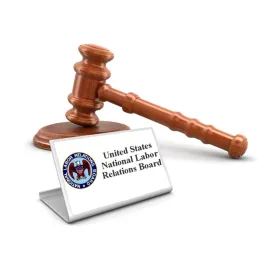The Board continues to issue decisions amidst the COVID-19 pandemic, while acknowledging that business operations around the country are far from “business as usual.” The agency is up and running. Representation elections vote counts are being conducted via video conference as are hearings. The remedy stage of unfair labor practice proceedings also has caught up with the these crisis-ridden times.
The headline from the Board’s decision on May 6, 2020 in Danbury Ambulance Service, Inc., 369 NLRB 68 (2020), is an acknowledgment of this “new normal.” The NLRB temporarily suspended its standard remedial requirement that an employer must post a notice to employees at the involved facility within 14 days, notifying employees of the employer’s violation and advising employees of their rights under the Act. The suspension of notice-posting applies only to employers who are closed or where a substantial number of employees are not reporting to work as a result of the COVID-19 pandemic.
In Danbury, the employer was charged with failing to bargain and respond to the union’s request for information regarding the termination of one of its members, as well as bypassing and denigrating the union in a phone call soliciting the employee to withdraw his grievance. The employer failed to contest the allegations, and the Board issued a default judgement.
As one of its remedies, the Board typically orders the employer (as the charged party) to post a Notice to Employees at the facility involved in the proceedings stating that it will take certain corrective actions and advising workers of their rights under the NLRA. Usually, the notices must be posted within 14 days after service of the decision to the employer, and must also be distributed through electronic means, such as email or intranet, if the employer customarily communicates with its employees in such a manner.
As part of its ruling in Danbury, the Board noted that many employers would be unable to post notices within the standard 14 days due to closures from the COVID-19 pandemic. Even if notice could be posted, “the whole point of the remedy will be defeated if employees (or union members) are not present to read the notice.”
As a result, the Board suspended its standard notice-posting requirement due to the ongoing pandemic—for employers that are closed and whose employees are not reporting to work. Employers should not and are not required to post physical notices or distribute electronic notices until 14 days after the involved facility reopens and “a substantial complement of employees have returned.”
The Board did not further define what constitutes “a substantial complement of employees,” but the “substantial complement” concept has been used by the NLRB as one of the factors in determining whether a company is a “successor” employer under the Act. Based on this standard, the Board likely will consider whether a majority of the job classifications are filled and the operation is engaged in substantially normal production.
Notably, employers with facilities that remain open and staffed by a substantial complement of employees are not affected by this change, and will remain subject to the standard 14-day notice-posting requirement. The Board indicated it will revert these changes “when conditions warrant.”
The Board also addressed electronic posting holding: “employers that customarily communicate with their employees by electronic means may not be doing so while their businesses remain closed. Thus, any pandemic related delay in the physical posting of notices will also apply to the electronic distribution of the notice.” This leaves open a couple of questions. What if employees are working from home and in electronic contact with their employer? In this circumstance, the employees all could receive the notice by email or by the employer posting it on the intranet. Does this still mean the employer will have to post the notice physically after the pandemic ends?
We will keep you posted of further developments.





 />i
/>i

